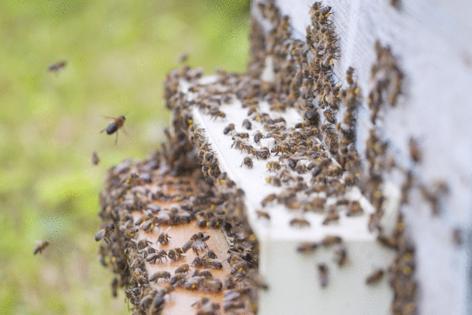Commentary: Thank the bees this apple season
Published in Op Eds
In many places, autumn is synonymous with apples. Apple-laden orchards invite us to pick our own, farm markets boast gorgeous bushels of Granny Smith and Honeycrisp (my favorite) and homemade apple pies cool on kitchen countertops. We often thank farmers for this bounty, and rightly so. But someone else deserves our gratitude as well: bees.
Apple trees, like most fruit-bearing plants, cannot produce on their own. Without pollinators, not just apples but also pumpkins, squash, pears, plums and countless other crops would fail. Yet, while we enjoy the (literal) fruits of their labor, we often fail to consider what life is like for the bees.
Bees are more extraordinary than most of us realize. They communicate with their sisters through intricate dances that convey direction and distance. They use the sun as a compass and can detect polarized light, which helps them find and identify flowers. These tiny navigators can even remember landmarks, sun positions and skylines. They demonstrate self-awareness. They can recognize human (and possibly bee) faces. They dream. They can feel anxious, optimistic, fearful and frustrated—just like us.
And they can suffer.
Pollination occurs naturally when free-living bees forage for nectar and pollen, but commercial beekeepers often force bees into unnatural and stressful conditions. Monoculture farms (those that grow a single crop, often over a large area) treat pollination as a profit-making machine, trucking billions of honey bees across the country to pollinate crops every year. Trapped in hives stacked in tractor-trailers, the bees endure stressors including temperature extremes, unsettling vibrations and poor ventilation on grueling journeys that can last days.
Once they reach their destination, they face new dangers—pesticides, parasites and malnutrition kill countless bees every year. And after pollination season ends, many of those who managed to survive are weak and diseased.
Beekeepers go so far as to manipulate bee reproduction by extracting semen from drone bees—often crushing them in the process—then artificially inseminating queens by anesthetizing them in tiny gas chambers and injecting semen into their oviducts. Even hobbyist beekeepers frequently clip queens’ wings to prevent swarming, a colony’s natural way of reproducing. Many kill and replace queens who don’t produce enough offspring.
Then there’s the honey industry. Foraging bees may visit over 2,000 flowers and travel miles in a single day to collect nectar. Once back inside the hive, they painstakingly transform it into honey by passing it from bee to bee, infusing it with enzymes, and spreading it across carefully crafted combs where the colony’s beating wings slowly dry it. And when their honey is perfectly thick and preserved, they seal it away with wax and save it as a lifeline for winter or other periods when nectar is unavailable. And yet, we break those seals and pillage what isn’t ours.
We must do better. Bee populations are declining at alarming rates, with studies showing losses ranging from 60-100% in some regions. The climate catastrophe, pesticide exposure, parasites and diseases are taking a heavy toll on these precious pollinators, while monoculture farming, manicured lawns and the destruction of wildflower meadows strip away food sources. According to the American Veterinary Medical Association, the apiary industry is calling 2025 the worst bee die-off in U.S. history.
So, how can we thank the bees? It starts with recognizing them for who they are, not for what they provide us. Small, personal actions can make a big difference. Plant native flowers to offer plenty of foraging opportunities. Avoid pesticides and herbicides, which harm both bees and the plants they depend on. Reach for agave nectar or maple syrup and leave honey where it belongs—with the bees who worked so hard to make it.
Learning to care for bees undoubtedly makes that crisp apple or glass of cider even sweeter. After all, what could be more fitting for the season of abundance than offering gratitude to the tiniest, busiest and most underappreciated partners of the harvest?
____
Melissa Rae Sanger is a licensed veterinary technician and a staff writer for the PETA Foundation, 501 Front St., Norfolk, VA 23510; www.PETA.org.
_____
©2025 Tribune Content Agency, LLC.
























































Comments